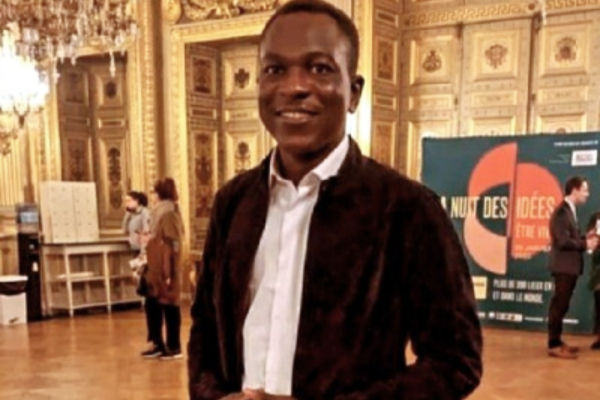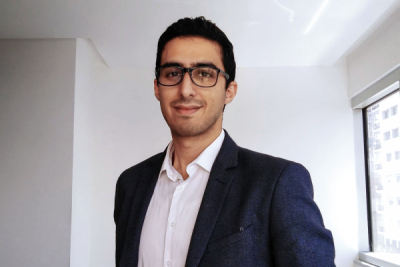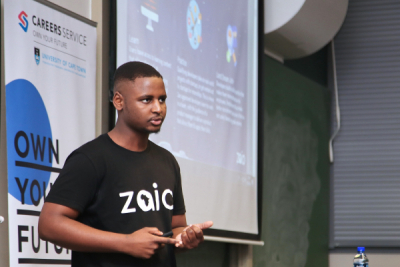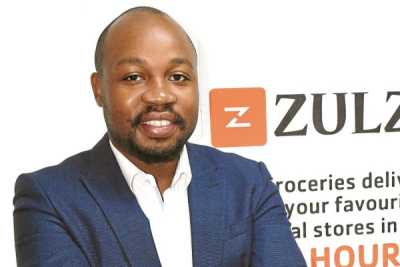
TECH STARS (1007)
He is passionate about using digital tools to improve various aspects of life, focusing on the field of health. Thanks to his startup, he has won several prizes and awards.
Hamidou Ouologuem (photo), co-founder and CEO of Kénèya Koura, a startup providing digital health services, is committed to enhancing patient care. Established in 2021 by Ouologuem, Fatoumata Diarra, and Oumar Dioni, Kénèya Koura delivers innovative digital solutions to improve healthcare accessibility. The startup’s services include online appointment scheduling, telemedicine consultations, and digital patient record management. It also promotes collaboration between local and international doctors, allowing patients to download their prescriptions online.
In addition to simplifying the patient experience, Kénèya Koura assists doctors in enhancing their organization, visibility, and patient retention. With operations in France, the startup also serves foreign patients.
Ouologuem, a native of Mali, holds a master’s degree in strategic marketing and communication from the École supérieure de commerce du Mali, earned in 2015, and a master’s degree in digital innovation from the Université de télécom in Saint-Etienne, obtained in 2018.
Owing to his dedication and expertise, Ouologuem was accepted into the Orange Digital Center in 2022, where he received financial support, training, and privileged access to Orange services.
With approximately a decade of experience, Ouologuem interned in Orange Mali’s marketing department in 2013. He served as the communications head at Pixel Communication in 2016 and was employed as a web designer by IT company CPG Consulting in 2018. The following year, he joined BCA Expertise, an automotive appraisal firm, as a communications officer.
His achievements have been celebrated with several awards. With Kénèya Koura, he won the Construire le Mali program in 2021. He was also honored as the best e-health startup at the Mali Digital Awards in 2022 and 2023.
Melchior Koba
With a decade of fintech experience, she has held numerous roles of responsibility. Her accomplishments have been recognized with awards and shared with fellow female entrepreneurs from Africa, Europe, and Canada.
Aïssatou Ami Touré (photo), the 35-year-old Managing Director of Yassir Sénégal, has been named the winner of the Margaret Awards 2024 in the African Intrapreneur category. The award was presented at a ceremony in Paris, France, on March 11, organized by Digital Women’s Day (JFD), which champions women’s creativity, innovation, and audacity in the digital sector.
Touré, who has been at the helm of the startup since May 2022, is developing a digital wallet within the company, which operates a super-application for booking taxis and delivering mail and parcels. The wallet, currently at the Proof of Concept stage, is designed to help users manage their budget and control their spending. The long-term goal is to extend the solution to other partners, particularly in the retail sector.
With this financial solution, Touré aims to improve consumer satisfaction regarding access to transport and food products and encourage widespread adoption of the digital platform in Senegal. Her work reflects her commitment to technological innovation and financial inclusion in Africa.
Touré, who has over a decade of experience in fintech, holds a bachelor’s degree in business administration with a major in finance from Suffolk University in Boston, and a master’s degree in science with a major in finance from NEOMA Business School. She began her career at Orabank Senegal in 2011.
She joined Tigo Cash, Tigo Senegal’s mobile financial services department, as a product manager in May 2013. In February 2014, she was promoted to Customer Operations Supervisor, and Director of Operations in June 2015. During her tenure at Tigo Cash, she developed professional procedures that were crucial in obtaining licenses to issue electronic money.
In December 2016, Touré joined Ecobank Senegal as Head of Mobile Banking, and was promoted to Head of Remittances and Mobile Banking in February 2018, a position she held until May 2022. Her dedication to financial inclusion has led her to advise and support start-ups looking to enter the field of digital finance, contributing to a more dynamic and accessible financial ecosystem.
As a recipient of the Margaret Prize, Touré will benefit from various JFD programs designed to support the growth and international influence of startups and entrepreneurial initiatives led by women from Europe, Africa, and Canada.
Trained as a computer scientist, she aims to optimize the monitoring of children by their parents and schools. Supported by the Orange Group, she continues to develop her business across Africa.
Sayouri Soukaina (photo), a computer scientist by training and the founder of Schoolify, leads its Moroccan division with a mission to enhance school monitoring for schools, students, and parents.
Established in 2021, Schoolify provides a suite of management solutions for schools, encompassing school monitoring, administrative management, geolocation, and real-time tracking of school transportation. The platform empowers school administrations to manage all school services online, maintain comprehensive student records, and facilitate constant communication with parents.
Schoolify offers students an online educational space that integrates all school-related activities, including lessons, exercises, schedules, canteen services, grades, and periodic reviews. The application also provides a comprehensive overview of all school activities, including report cards and textbooks.
In 2017, Soukaina also co-founded Sotinor, a communications agency where she serves as CEO. Sotinor assists entrepreneurs in conducting precise business diagnostics, enhancing profitability, and making informed strategic decisions.
Soukaina, a Moroccan national, earned a degree in computer engineering in 2014 from the Agadir Polytechnic in Morocco and a master’s degree in computer science in 2015 from the University of Lorraine in France. In 2019, she joined the StartOn program by Orange and received two years of support. She launched Schoolify at the end of this program.
“Thanks to the support from Orange’s StartOn, I was able to market my product ,‘Schoolify’, in [...] four countries in Africa. As for the support program, I’m in the process of gaining solid knowledge and expertise, thanks to our coaches. Not to mention the fact that I’ve built a robust customer portfolio,” Soukaina explains.
Melchior Koba
He aims to help maintain a healthy environment and make life easier for Moroccan travelers. An entrepreneur specializing in mobility, he has received several awards for the impact of his solution.
Hicham Zouaoui (photo), a Moroccan entrepreneur and computer scientist, is the co-founder and CEO of Pip Pip Yalah, a startup aimed at simplifying and reducing the cost of travel for Moroccans through a long-distance carpooling platform.
Established in 2018 by Zouaoui and Otman Harrak, Pip Pip Yalah connects drivers embarking on long journeys with passengers via its namesake app, to cut travel expenses and CO2 emissions.
The concept of Pip Pip Yalah originated in 2013 as a Facebook page where drivers used to post their offers and interested passengers responded by commenting or sending private messages. “The social network allowed us to test the market fit of the concept freely and organically,” Zouaoui stated.
Boosted by Orange Fab, the startup has amassed a community of over 400,000 members and has facilitated more than 1,000 journeys across Morocco.
Zouaoui, a graduate of Moulay Ismail Meknes University, earned a bachelor’s degree in computer engineering in 2011 and a master’s degree in quality, health, and safety management from Ibn Tofail University in 2015.
He started his professional career in 2014 at Webhelp, a data company, serving as the continuous improvement manager. In 2017, he joined CloudControl, a software company, as a global key account manager. In 2021, he became a partner at Ideancy, a creative agency specializing in digital communications consultancy and web marketing in Morocco and France.
Zouaoui has been recognized with several awards for his impactful contributions. In 2020, his Pip Pip Yalah solution was honored as the best application of the year at the Maroc Web Award. That same year, he secured the second prize at the Orange Social Venture Prize POESAM in Morocco.
Melchior Koba
He is committed to fostering a new generation of young tech innovators and entrepreneurs. He has helped hundreds of young software developers get jobs with major companies.
South African entrepreneur Mvelo Hlophe (photo), founder and CEO of Zaio, spearheads initiatives to transform South Africans into leaders and innovators through training programs. Through his company, Zaio, he focuses on equipping individuals and businesses with computer programming skills.
Established in 2017, Zaio is an online platform aimed at providing Africans with digital skills training and assisting budding software developers in securing their first jobs.
“We are training the next generation of tech leaders on the continent. Our approach is so novel and when people start realizing just how great it is, there will be a shift in our EdTech platforms, the value they bring, and how suited they are to individual users. Ours is to create a foundation, not only by increasing the pool of quality talent on the continent but also to create a standard when it comes to EdTech products our people will interact with,” Hlophe stated in 2022.
By 2023, the startup had already registered over 10,000 users. Its platform has facilitated 200 users in obtaining developer positions with organizations such as Sanlam, the World Bank, and Standard Bank. Zaio aims to broaden its operations across the continent, targeting regions like Kenya, Nigeria, and Egypt.
Hlophe, a graduate of the University of Cape Town with a Bachelor’s degree in Finance and Accounting (2017) and a Bachelor’s degree in Politics, Philosophy, and Economics (2020), is an impact entrepreneur with Further, a company that supports entrepreneurs. He has been a fellow of the Allan Gray Orbis Foundation since 2021.
Melchior Koba
After his studies, he worked as a software engineer in several companies. As an entrepreneur, he is digitizing the commerce and delivery sector in South Africa.
South African software engineer and entrepreneur, Donald Vutlharhi Valoyi (photo), is the founder and CEO of Zulzi, a platform that provides on-demand delivery of groceries, fresh produce, and essentials.
Zulzi, established in 2013, evolved from Zulzi.com, an e-commerce platform initially targeting students with immediate delivery of books and electronic devices. This service laid the groundwork for the creation of the on-demand delivery platform.
Zulzi enables customers to purchase a wide range of items, from groceries and alcohol to pharmaceuticals and food. Customers can compile their shopping lists and have their orders delivered automatically. The platform fosters a community where colleagues and neighbors can share delivery costs and order quality products from each other.
According to Valoyi’s LinkedIn page, “Zulzi is a grocery delivery marketplace that gives members direct access to thousands of grocery items through a mobile app. The app allows customers to build their grocery lists and purchase items without ever visiting a store. Trained Shoppers then handpick and deliver the items, transforming the grocery shopping experience.”
Valoyi graduated from the University of the Witwatersrand in 2007 with a Bachelor of Science. That same year, he embarked on his career as a software engineer at Mavoni Technologies, a firm specializing in information technology, consulting, and business process outsourcing.
In 2010, Valoyi joined EOH, a technology company offering IT services, software, and industrial technologies, as a Java developer. In 2011, he advanced to the position of technical team leader at First National Bank South Africa.
Melchior Koba
BBIncubator is striving to position entrepreneurship as the cornerstone of development in Cameroon. The organization conducts various events and provides development programs for entrepreneurs.
Boris Bison Youth Empowerment Incubator (BBIncubator), a Cameroon-based incubator established in 2020, is committed to fostering an environment that enables emerging entrepreneurs to achieve their aspirations.
The incubator’s vision is to empower young Cameroonians aged between 18 and 35 to combat poverty and job scarcity by establishing successful businesses, according to its website.
Under the leadership of founder and CEO Boris N. Ngala, BBIncubator offers workspace, guidance, mentorship, and coaching to the innovative startups it identifies. The incubator’s objective is to empower businesses to generate consistent profits for the development of the Cameroonian community.
In 2023, BBIncubator launched its inaugural Tech Pitch competition, “Finance your Startup,” for young Cameroonian entrepreneurs. The competition allows entrepreneurs to present their technological ideas to a panel of judges, with the winner receiving startup financing of XAF1 million (approximately USD 1,600).
BBIncubator also initiates an incubation program every three months to mentor, train, and advise young entrepreneurs. The program offers insights into company operations and trains entrepreneurs in the use of the Internet and modern payment gateways.
Incubatees have access to BBIncubator’s computing equipment, cloud services, and broadband internet connection, as well as a laboratory for IoT (Internet of Things) and ICT (Information and Communication Technology) prototyping. The incubator also organizes networking events and conferences and provides entrepreneurs with access to seed capital.
Through its programs and activities, BBIncubator aims to assist new businesses in overcoming their daily challenges.
Melchior Koba
An experienced business leader, he is passionate about developing solutions that improve the quality of life of Africans. As an entrepreneur, he specializes in renewable energy.
Thony Ngumbu (photo), a Congolese entrepreneur and co-founder and CEO of Mwinda Technologies, is committed to designing clean energy solutions and financing options. His startup aims to address the lack of reliable energy and financial inclusion in sub-Saharan Africa.
Established in 2018, Mwinda Technologies is a U.S.-based cleantech and fintech company that launched operations in the Democratic Republic of Congo in 2019. The company offers a variety of renewable energy solutions, including the installation of solar panels for residential, commercial, and industrial customers. It designs battery storage systems to provide electricity in the event of grid failure and maintains solar and battery backup systems.
In collaboration with its partners, Mwinda Technologies offers short-term supplier credit for the hybrid solar systems it manufactures or battery backup systems. It also enables customers to purchase their solar systems by paying in installments, with the option to repay their debt using mobile money from their mobile phone.
Before Mwinda Technologies, Ngumbu founded Genesis Ventures in 2014, where he served as managing partner until 2018. Genesis Ventures is a strategy and business development consultancy dedicated to creating high-growth, high-impact businesses on the African continent, operating in sectors including agriculture, energy, mining, transport, and infrastructure.
Ngumbu, a U.S. Army veteran, holds a bachelor’s degree in political science and economics from the University of Houston and a master’s degree in business administration from Rice University’s Jones Graduate School of Business. He also studied computer science at Wartburg College.
His professional career began in 2002 at Verizon Wireless, a cellular phone provider, where he served as a senior technical analyst. From 2013 to 2016, he was the senior director of programs, operations, and resource development at IEDA Relief, a non-governmental organization that assists vulnerable people worldwide.
Melchior Koba
Leveraging his technological expertise, he has developed solutions that significantly enhance the livelihoods of small-scale farmers. The transformative impact of his innovations has earned him numerous accolades and awards.
Senegalese entrepreneur Mouhamadou Lamine Kebe (photo), co-founder and CEO of Tolbi, is using technology to enhance the management and monitoring of agricultural crops, contributing to food security. Established in 2020, Tolbi is an agritech startup that develops sustainable agriculture solutions based on artificial intelligence and satellite imagery.
The company’s e-Tolbi tool aids farmers in monitoring millions of hectares of plantations. Leveraging AI and satellite imagery, the tool can estimate and predict yields, calculate input requirements, and anticipate risks associated with climate hazards, diseases, and pests.
Tolbi supports farmers by providing them access to weather information through various methods, including automated calls in the local language. This assistance helps farmers become more resilient to climate change and increase their yields and income.
Kebe, a member of the Internet Society’s executive committee since 2018 and a 2020 graduate of the Ecole Supérieure Polytechnique de Dakar, explained in 2022 why he decided to establish Tolbi. He noted that existing technologies were not adapted to the African social context, were expensive, and often in French or English, making them inaccessible in rural areas with limited internet connectivity.
Kebe, who served as a local coordinator of the China Hardware Innovation Camp program in 2019 and an advisor to the “entrepreneurship and innovation” unit at the Ecole supérieure polytechnique de Dakar in 2020, has received numerous awards for Tolbi. These include the President of the Republic’s Grand Prize for Digital Innovation in 2020 and second place in the 2021 Num-Urb competition for digital technology for urban development.
Melchior Koba
A serial entrepreneur, he aims to maximize the profits of small and medium-sized businesses. His entrepreneurial career has won him national and international awards.
Ugandan entrepreneur Daniel Mukisa (photo), co-founder and CEO of Ridelink, is leveraging technology to provide transport and logistics services to small and medium-sized businesses across Africa and beyond.
Mukisa was motivated to find a solution to the high transport costs that were impacting the profitability of small businesses. "I noticed that a lot of the proceeds from the store went towards transporting the produce from the farmer to us the retailers. I challenged myself to come up with a solution that would curb the high transport costs that ate deep into the bottom line of the small businesses," he explained in 2021.
Established in 2017, Ridelink uses artificial intelligence and machine learning to connect SMEs with over 10,000 drivers and more than 3,000 other businesses on similar routes, helping them reduce costs. The platform, accessible via web and mobile app, also offers security features, allowing users to track and trace their cargo. The company’s goal is to help SMEs increase revenues, enhance mobility efficiency and performance, and access new markets.
Mukisa, a 2017 Bachelor of Commerce graduate from Makerere University, co-founded Transporter Corporation in 2014 before launching Ridelink. Transporter Corporation, where Mukisa served as head of operations until 2017, offers motorbike delivery solutions in Kampala, Uganda.
Mukisa’s entrepreneurial journey has earned him several national and international accolades. He was a recipient of the Anzisha Prize in 2015, a finalist in the 2021 Africa’s Business Heroes competition, and was named in the 2022 Forbes 30 Under 30 list, which honors young Africans who make a sbig impact through innovation.
Melchior Koba
More...
The initiative is designed to foster the emergence of national champions, stimulate the development of innovative digital solutions, and create value for retailers while improving the consumer experience.
Moroccan Retail Tech Builder (MRTB), a platform for incubating and accelerating retail-focused technology startups in Africa, was launched as a collaborative effort between the Ministry of Industry and Trade, Mohammed VI Polytechnique University, and the OCP Foundation.
Launched in 2022, it supports entrepreneurs from the ideation and prototyping phase to the market launch and acceleration phase, connecting project owners with experts, business leaders, and mentors. The platform also hosts events to showcase its developed and developing e-commerce solutions to potential customers and investors.
Startups under MRTB’s umbrella have access to dedicated workspaces like StartGate, a startup campus affiliated with Mohamed VI Polytechnic University. This international entrepreneurial ecosystem provides world-class infrastructure and resources to support startups.
MRTB offers several programs to foster innovation. The “Create” program assists entrepreneurs in transforming their innovative digital solution concepts into prototypes, offering three months of specialized support and culminating in a “Demo Day” for project presentations.
The “Start” incubation program supports the transition from prototype to market launch, aiding incubatees in transforming their viable business models into companies.
The “Scale” program is designed to accelerate the growth of innovative startups, providing founders with the necessary tools to develop, deploy, and increase the value of their businesses.
Through these programs and activities, MRTB aims to support the development of innovative digital solutions for around a hundred retail projects, enabling beneficiaries to modernize and create value.
Melchior Koba
With over 20 years of experience in the digital industry, he has held several senior positions.
Moroccan entrepreneur Larbi Alaoui Belrhiti (photo), co-founder and co-CEO of YoLa Fresh, is on a mission to transform the fresh produce sector in Africa. Leveraging technology and data, he aims to enhance the entire fruit and vegetable processing chain, from cultivation to consumption.
Through his startup YoLa Fresh, founded in 2023 with Youssef Mamou, he connects farmers with fresh produce retailers to bolster their businesses. The startup harnesses data, machine learning, and artificial intelligence to predict demand and supply, price dynamics, and other key metrics.
Belrhiti and his co-founder’s primary objective with YoLa Fresh is to eliminate all intermediaries in the food supply chain, enabling retailers to cut costs and farmers to maximize profits more efficiently.
A holder of a master’s degree in computer science from Polytechnique Montréal, Canada, obtained in 2004, Belrhiti is also an alumnus of HEC Paris, where he earned a master’s degree in business administration in 2013.
Before YoLa Fresh, he established several companies. In 2005, he founded TheMafiaBoss.com, an online Mafia-themed game, which he ran as CEO until 2012. In the same year, he also founded Avito.ma, a Moroccan online classified ads site, which he led as Chairman and CEO until 2017, when it was integrated into the Spanish ad group Adevinta (formerly Schibsted).
The entrepreneur’s professional journey began in 2004 at Oracle as a software engineer. He later worked as a consultant at Accenture, a business services company. In 2017, he joined Jumia as the managing director of the company in Morocco. In April 2022, he was promoted to Managing Director of Jumia Express Logistics, a position he held until the inception of YoLa Fresh.
Melchior Koba
He seeks solutions for workplace efficiency concerns. His achievements have already won him several awards.
South African entrepreneur Velani Mboweni, co-founder and CEO of startup Lüla, is connecting workers with private shuttle drivers. His platform offers a sustainable, secure, and affordable transport solution in emerging markets.
Established in 2016, Lüla provides a local service that transports users from their homes to their workplaces and vice versa. The primary clientele of this solution are companies seeking to ensure efficient commutes for their employees.
Mboweni, a University of Cape Town graduate with a Bachelor’s degree in Philosophy, Politics, and Economics, furthered his education with a postgraduate diploma in business administration from Wits Business School in 2016. He also holds a bachelor’s degree in political science from the University of the Witwatersrand, obtained in 2017.
Before Lüla, Mboweni co-founded Phambili Mzansi in 2015, a non-profit organization that facilitates connections between people, knowledge, and resources. He currently serves as a director and board member of Wesgro, an organization that links foreign investors with local exporters in the Western Cape, South Africa.
In addition, Mboweni is a member of the advisory board of the Council for Scientific and Industrial Research, a research organization that focuses on the study, development, localization, and dissemination of technologies to boost socio-economic prosperity in South Africa.
Mboweni, a member of the Harambe Entrepreneurs Alliance African Innovators since 2018, served as the Head of Business Development at eTranzact International PLC, a Nigerian mobile banking and payment services provider, from 2010 to 2014. In 2017, he joined the African Youth Commission, an independent pan-African youth network, as the commissioner for human resources, science, technology, and innovation, a position he held until 2019.
Mboweni’s professional and entrepreneurial career has earned him several awards and distinctions. In 2019, Lüla was named “Start-up of the Year” at the Global Startup Awards. In 2022, he was recognized in the Forbes 30 Under 30 list.
Melchior Koba
Young Africans often wonder how to turn their ideas into successful, sustainable businesses. In Cameroon, Ecolia Labs, through its programs and activities, offers a solution to those worries.
Cameroonian incubator Ecolia Labs is empowering young entrepreneurs to create high-potential, financially viable businesses through digital innovation. Founded in 2014 by Yves Cedric Ntsama, the incubator wants to “build the future generation of tech social entrepreneurs that Cameroon and Central Africa need to meet its sustainable development challenges,” according to its website.
Ecolia Labs provides training in digital skills and entrepreneurship, with courses covering digitization, artificial intelligence, big data, robotics, the Internet of Things, cybersecurity, e-commerce, and web and mobile development. The incubator also offers training in innovative entrepreneurship and a project launch program.
It provides a range of opportunities for entrepreneurs, including pre-incubation, incubation, and financing. The pre-incubation program, lasting one month, allows young innovators to launch their ideas based on market needs. The incubation program, lasting up to 12 months, assists in validating a business model and acquiring initial customers.
Ecolia Labs also provides entrepreneurs with a fully-equipped co-working space, complete with a fiber-optic Wi-Fi connection, to foster collaboration. Additional resources include a manufacturing laboratory and a library.
In addition to its incubation services, Ecolia Labs assists businesses in their digital transformation. It hosts various events, such as the Women Digital Class, which trains women in professional digital skills to enhance their employability.
To date, Ecolia Labs has trained over 10,000 young people, supported more than 300 startups, and received over 20 awards and accolades. As a member of the AfriLabs network, it receives support from Orange, Afric’Innov, Bolloré Transport & Logistics, Ennova, Facebook, the African Union, and Innovation Edge, among others.
Melchior Koba















